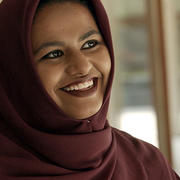
2020 Peter J. Gomes, STB ’68 Distinguished Alumni Honoree Milia Islam, MTS ’04, was eight years old when her family moved to the United States from Bangladesh, settling eventually in Fulton, MO. The small town was overwhelmingly white and very conservative. The Islams were the only Muslims and among only a handful of people of color.
Needless to say, life wasn’t easy.
At first there were fearful, often hostile glances. There were even occasional death threats. Undeterred, the Islams set down roots. Her mother, who had been in medical school in Bangladesh, worked at a shoe factory. Her father worked the graveyard shift at McDonald’s and went to school during the day to become an optician. Over time, the townspeople warmed up and, when Islam was admitted to HDS years later, they cheered.
“Those individuals who sent us death threats were the same people who celebrated that one of their own was going to Harvard,” she says. “They felt joy. It showed me what can happen when we go beyond the fear and engage with one another and connect on a human level.”
Today, Islam is the executive director of Southern California’s South Coast Interfaith Council (SCIC) the largest interfaith organization in one of the most religiously diverse environments in the world. SCIC works at the grassroots level in 120 different faith communities across 35 cities to bring people out of their “comfortable corners” so that they can form real relationships with one another.
“In southern California, you can walk down the street and see a Muslim woman like me, a Sikh, an orthodox Jew, Hindus, Buddhists, and many, many others,” she says. “We see each other, but we don’t take the time to engage because we’re in our enclaves. SCIC creates opportunities for people to come out of their fiefdoms and realize that they can connect with those who are different—and that when they do, their experience and existence becomes richer and more meaningful.”
Islam says that it’s particularly meaningful to be a Gomes Honoree because her HDS experience made her interfaith work possible. She says that she felt “humbled and grateful” when she heard she’d been selected by her fellow alumni/ae.
“Harvard and the Divinity School were transformative experiences for me,” she says. “It prepared me not only intellectually, but also as a human being to take responsibility and use my knowledge and experience to make the world better today than it was yesterday.”
For Islam, who calls herself “as American as apple pie,” making the world better means fighting stereotypes of the religious “other” by connecting people of different faiths—and experiencing the joy that occurs when you see someone change right before your eyes.
“I love what I do,” she says. “I’m always meeting new pastors, rabbis, imams, etc. I always have a phone conversation before. It still amazes me. When they see me for the first time [in hijab and modest dress], they do a double take. ‘You’re Milia? I didn’t think you were going to be like… you.’ When we can look beyond appearances and connect, positive things happen. Little things contribute to making society and world a better place.”
-Paul Massari
